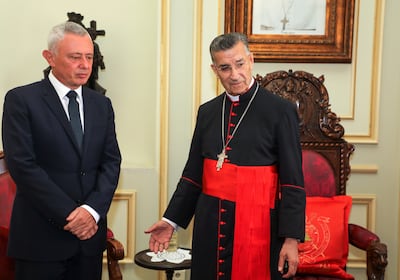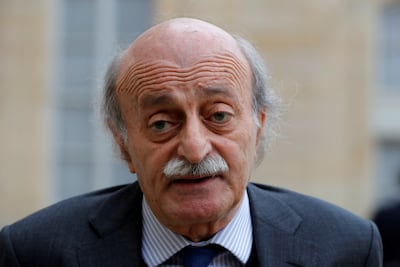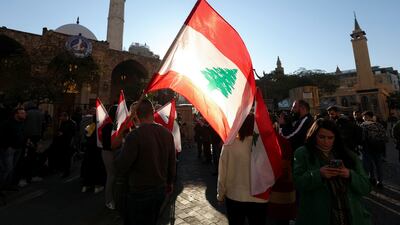Recently, the Lebanese Druze leader Walid Jumblatt, in an interview with Al-Akhbar, said he did not oppose the election of Suleiman Frangieh as Lebanon’s president. This came after a period in which Mr Jumblatt had said precisely the contrary. To many observers, the fact that Al-Akhbar is close to Hezbollah indicated that the Druze leader was sending a message to the party of his potential willingness to endorse its candidate.
Mr Jumblatt is considered a weathervane of Lebanese politics, and his step was carefully calculated. He underlined that his views of Mr Frangieh did not necessarily involve his parliamentary bloc (a useful fiction he often maintains), which is headed, officially at least, by his son Taymour. Therefore, if the bloc was to vote for Mr Frangieh, Mr Jumblatt implied, the candidate would have to make political concessions.
Mr Franjieh’s problem, given that Lebanon’s presidency is reserved for Maronite Christians, is that all the leading Christian parties oppose him. Therefore, the votes of the Jumblatt-led parliamentary bloc would be necessary for him to be elected by a non-Christian majority, along with the votes of some Christian parliamentarians affiliated with Muslim-led blocs. This puts Mr Jumblatt in an enviable position.

Mr Jumblatt’s move was probably motivated by a statement more than two weeks ago by Speaker Nabih Berri, who is a key Hezbollah ally. Mr Berri declared that Mr Frangieh was “the only candidate” for the presidency. The Druze leader always navigates close to Mr Berri and understood that his remark was a reaffirmation that Hezbollah would accept no one else.
Since Mr Jumblatt has no intention of confronting Hezbollah, he saw the political benefit in trying to exploit any consensus around Mr Frangieh. Beyond that, however, why did Mr Jumblatt move at a time when the election of a president still seems to be far off, given the conflict in Gaza and Hezbollah’s decision to support Hamas by opening a Lebanon front? Several things explain the Druze leader’s calculation.
The first is tied specifically to the conflict in Gaza. Many Lebanese, Mr Jumblatt among them, anticipate that once the war along the border with Israel ends, Hezbollah will press to secure the election of a president in whom it has confidence, who will protect the “resistance” the party embodies. From the start, Hezbollah said it sought Mr Frangieh’s election because he would not “stab the resistance in the back”.

Currently, there is rising Israeli and US pressure for a durable agreement along the southern border. Hezbollah wants to ensure there is a president in place who can defend the party’s priorities in any negotiations, or, if the presidential election comes later, in the aftermath of such an agreement. The negotiations would probably involve the US, one of the members of a group of five countries that have formed a contact group on Lebanon, which also includes France, Saudi Arabia, Qatar and Egypt.
Hezbollah may also sense an opportunity here. If there is no presidential election before talks over an understanding on the Lebanese border, which Israel has set as a condition to not invade Lebanon, the party may link Mr Frangieh’s election to any concessions it might make. In other words, if it is asked to withdraw units away from the border, even symbolically, one of the things it may demand in exchange is that the group of five accept Mr Frangieh.
It is increasingly apparent to the group of five that Iran, through Hezbollah, will have a role to play in the presidential election, even though it is not represented in the group. Which is why the Lebanese took notice of a very friendly meeting last week between the Saudi and Iranian ambassadors in Lebanon. In the Gaza conflict, Riyadh has taken a stronger line against Israel, and refused to participate in a coalition of countries the US was trying to form to combat the Houthis.
Iran has welcomed this, and the Saudi-Iranian rapprochement is expected to have a positive impact on the Lebanese scene, perhaps paving the way for eventual Saudi acceptance of Mr Frangieh. This would be important, because if the kingdom comes around, it might be able to persuade its leading Lebanese Christian ally, the Lebanese Forces Party, to vote for Mr Frangieh, lending him communal legitimacy.
The five will reportedly meet in February, though no date has been set. But with some sort of settlement in the Gaza war now part of the equation, there is an opportunity to stabilise Lebanon by ending the presidential vacuum, as a way of stabilising the situation in the Levant.
The lingering question is whether the Lebanese Christian parties would go along. It is with great anxiety that the Christians have watched their power wane in Lebanon, and this can only increase if the most senior Maronite Christian post is decided mainly by non-Christian parties, backed by regional and international powers.
But Christian interests are the last thing on the minds of most countries fed up with Lebanon’s dysfunctional system. The war in Gaza has turned developments in Lebanon into one dimension of addressing the Palestinian-Israeli conflict. How ironic, then, that the five countries might sign off on an arrangement that ultimately strengthens Iran and its allies, who have already benefited greatly from this conflict.


